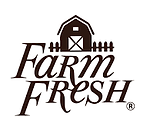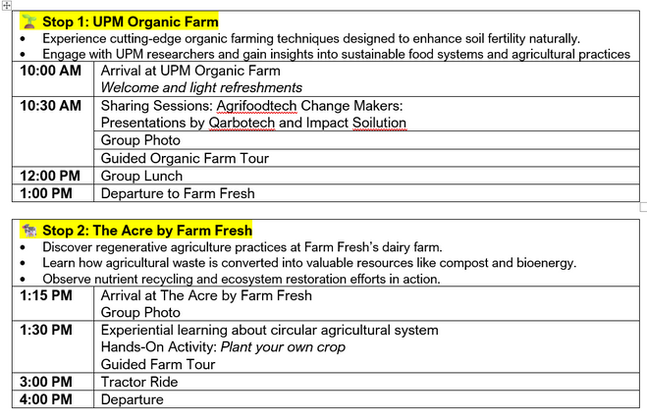



Thursday, 5 December 2024
UPM Organic Farm & The Acre by Farm Fresh
10:00 am to 4:00 pm
As we mark the 5th anniversary of the World Soil Day Celebration in Malaysia, Impact Circle is excited to announce this year’s dual-site celebration at two iconic locations: UPM Organic Farm and The Acre by Farm Fresh. This year’s theme, "Caring for Soils: Measure, Monitor, Manage," underscores the importance of sustainable soil management practices in ensuring food security, preserving biodiversity, and building climate resilience. Both UPM and Farm Fresh exemplify the power of innovation and commitment in advancing soil health and regenerative agriculture practices.
At UPM Organic Farm, participants will explore cutting-edge academic and field applications of sustainable agriculture techniques, reinforcing the vital role of research and education in shaping the future of farming. Meanwhile, The Acre by Farm Fresh offers a unique perspective on how corporate commitment to regenerative agriculture can lead to transformational results. From recycling farm waste for cow bedding and irrigation to implementing a circular agricultural system, Farm Fresh demonstrates how sustainable practices can significantly enhance soil health, reduce environmental impact, and inspire others in the industry.
We look forward to celebrating the importance of soil with these remarkable partners, creating awareness, sharing knowledge, and inspiring change for a healthier and more sustainable future. Join us this December 5th for a day of learning, collaboration, and impactful action!
Brought to life by
活动主持与组织
-01.png)
Powered by

活动执行


.png)
The theme for World Soil Day 2024, "Caring for Soils: Measure, Monitor, Manage," highlights the crucial role of accurate soil data and information in understanding soil characteristics and enabling informed decision-making for sustainable soil management and food security.
Soil data encompasses the raw measurements of soil’s physical, chemical, and biological properties, gathered through advanced tools like sampling, laboratory analysis, and remote sensing technologies. Soil information, on the other hand, refers to the analyzed and synthesized representation of this data, which provides actionable insights into soil health, function, and management. Together, they form the backbone of sustainable agriculture, guiding land use, agricultural practices, and policy development at all levels.
Emerging technologies such as digital soil mapping, machine learning, and cloud computing are revolutionizing how we measure and utilize soil data. Regularly updated and shared soil data allows farmers, researchers, and policymakers to make decisions that reflect the reality of the soil, enhancing productivity while conserving resources. However, barriers such as inadequate infrastructure and limited data-sharing frameworks hinder the full potential of soil information systems. Initiatives like the Global Soil Information System (GloSIS), the Global Soil Laboratory Network (GLOSOLAN), and FAO-supported programs like SoilFER are working to address these gaps. By building national soil information systems, harmonizing data at regional and global levels, and strengthening laboratory capacities, these efforts empower countries to better manage their soil resources.
The impact of accurate soil management extends beyond agriculture. By aligning with Sustainable Development Goals (SDGs) such as food security, climate action, and biodiversity preservation, soil data plays a pivotal role in sustainable development. For example, effective use of soil data can enable carbon sequestration of up to 2 gigatons of CO2 annually and improve nutrient efficiency in crops by 30%, contributing to both environmental and food security goals.
As we embrace this year’s theme, we emphasize the need for collaboration, innovation, and shared responsibility to measure, monitor, and manage soils effectively, securing a sustainable future for generations to come.
Did you know?
95% of our food comes from soils.
33% of soils are degraded.
It can take up to 1 000 years to produce just 2-3 cm of soil.
Soils supply 15 of the 18 naturally occurring chemical elements essential to plants.
There are more living organisms in a tablespoon of soil than people on Earth.
Over the last 70 years, the level of vitamins and nutrients in food has drastically decreased.
2 billion people worldwide suffer from lack of micronutrients, known as hidden hunger.
Agricultural production will have to increase by 60% to meet the global food demand in 2050.
Up to 58% more food could be produced through sustainable soil management.
Up to half of our household waste could be composted to nurture our soil.
REGISTRATION CLOSES ON 20 NOVEMBER 2022
Please click on the menu tab to view details.

Partnership Opportunities
The Partnership packages have been devised to ensure that all partners will be able to derive maximum exposure for their contributions. There are four premium partnership categories. Each category provides a specific level of benefits for your contributions. The contributions received are to be used to support the initiatives/programs and to defray the cost of the setup, resources, and manpower. Please support our efforts to make a meaningful difference in our food systems transformation to build an inclusive, sustainable and well-nourished society.









